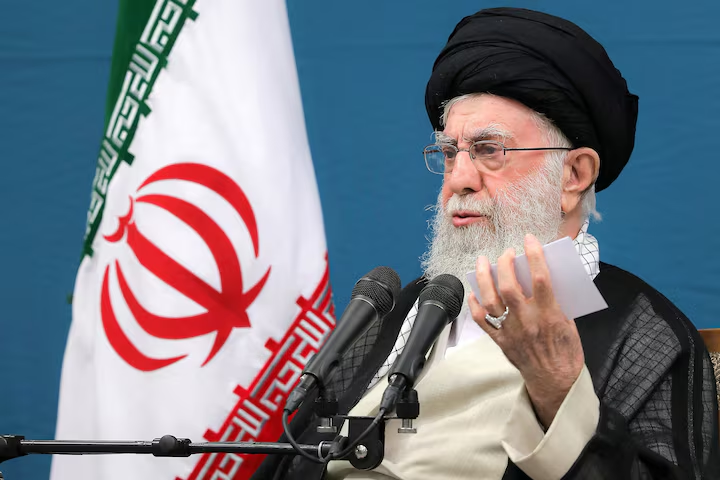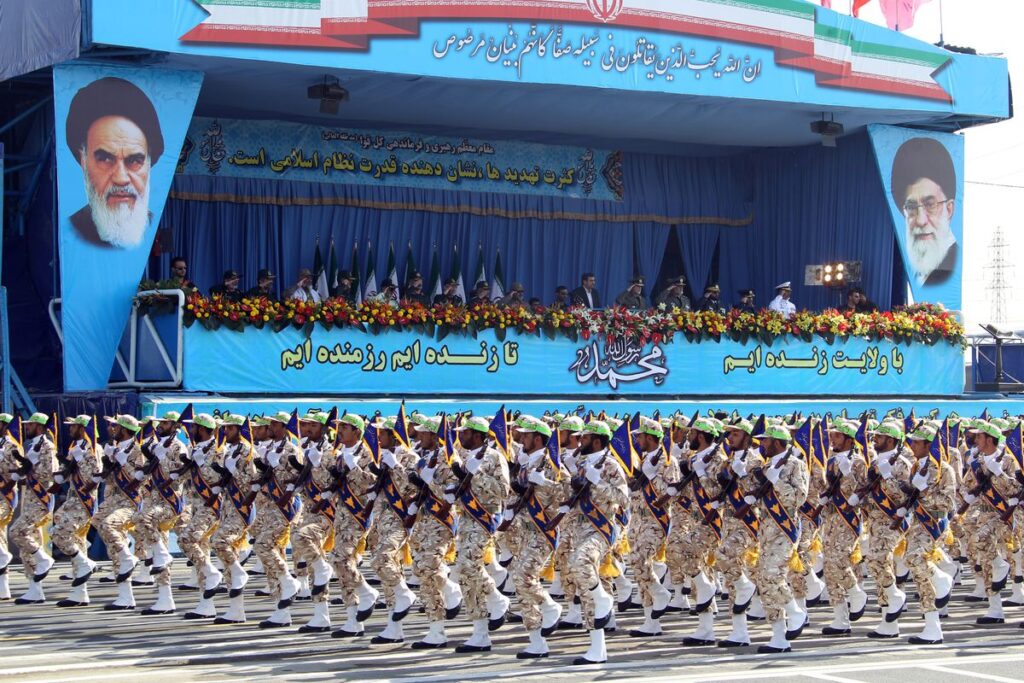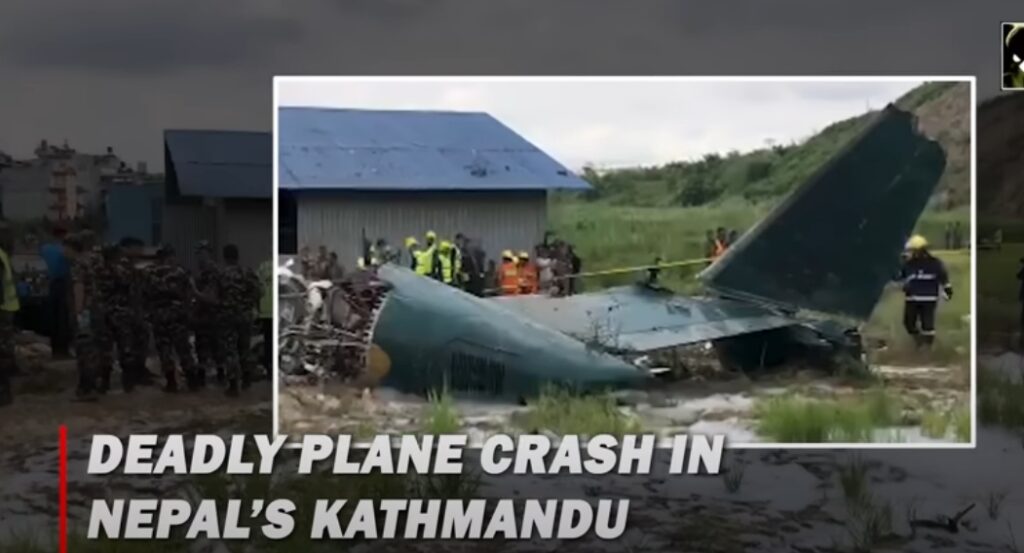Iran’s Supreme Leader Ayatollah Ali Khamenei has made a rare public statement. He strongly criticized India’s treatment of its Muslim minority. This has caused tension between Iran and India, two important regional powers.
Khamenei’s comments come at a sensitive time. Iran is facing issues like leadership succession and its nuclear program. It’s also changing how it interacts with the U.S., Israel, and other global powers.

Key Takeaways
Table of Contents
Toggle- Iran’s Supreme Leader Ayatollah Ali Khamenei has publicly criticized India’s treatment of its Muslim minority population.
- Khamenei’s remarks have escalated tensions between Iran and India, two influential regional powers.
- The criticism comes amid concerns over Khamenei’s health and the potential for leadership transition in Iran.
- Iran’s nuclear stance and its relationships with the U.S., Israel, and other global powers are also factors in the ongoing tensions.
- The political influence of Iran’s supreme leader and the Revolutionary Guard’s role in regional dynamics are important considerations.
Iran’s Supreme Leader Criticizes India’s Treatment of Muslims
Ayatollah Ali Khamenei, Iran’s Supreme Leader, has strongly criticized India’s treatment of Muslims. Known for his hawkish foreign policy and support for the Iranian Revolutionary Guard, Khamenei says India ignores Muslim massacres.
Khamenei’s harsh words come as the world worries about religious minorities in India. His Iranian leader’s criticism of India’s Muslim treatment aims to increase his influence in the region. This is especially true given Iran’s strained relationship with Israel.
“The Muslim population in India has been living in the despair of the Citizenship Amendment Act, which has denied them their rights and terrorized them.”
Khamenei’s statement highlights the growing tensions between Iran and India. These two major powers have different strategic interests and geopolitical views. The Iranian Revolutionary Guard plays a key role in Iran’s foreign policy. Khamenei’s criticism of India’s Muslim policies could greatly affect their relationship.
The controversy over Khamenei’s remarks shows the complex nature of Iran’s regional diplomacy. The Supreme Leader’s personal views and the interests of the Iranian Revolutionary Guard are crucial. The future of Iran-India relations is uncertain, with the risk of more escalation and diplomatic tensions.
Khamenei’s Controversial Remarks on India’s Policies
Iran’s Supreme Leader, Ayatollah Ali Khamenei, has sparked a lot of debate with his comments on India’s treatment of Muslims. His words have upset the Indian government and many around the world. This has led to a heated discussion on a very sensitive topic.
Understanding the Context of the Criticism
Khamenei has long been concerned about Muslims being treated unfairly. He believes Muslims are often marginalized and oppressed. He uses his platform to speak out against these injustices.
His comments come at a time of tension between India and Pakistan over Kashmir. Khamenei’s words are seen by some as a way for Iran to get involved in South Asia’s politics.
Reactions from India and the International Community
The Indian government has strongly rejected Khamenei’s comments. They say his words were unwarranted and out of line. This shows how sensitive the issue is and India’s stance on outside criticism.
The world has also reacted, with many calling for calm and respect for minority rights. Khamenei’s nuclear stance and his relations with the United States have also been scrutinized in the context of this diplomatic spat.
| Country/Organization | Reaction to Khamenei’s Remarks |
|---|---|
| India | Rejected the comments as “unwarranted” and “uncalled for” |
| United Nations | Called for de-escalation and preservation of minority rights |
| European Union | Urged both sides to exercise restraint and engage in dialogue |
| United States | Expressed concern over the potential for increased tensions in the region |
The situation is still tense, but the world hopes for a peaceful solution. Everyone wants to see respect for all communities in the region.
Escalating Tensions Between Iran and India
Iran’s Supreme Leader, Ayatollah Ali Khamenei, made critical comments about India’s treatment of Muslims. This has made the relationship between Iran and India even more complicated. Both countries are trying to keep their economic and diplomatic ties strong, but it’s getting harder.
Khamenei’s words have upset India, with officials saying his comments were not welcome. The Indian government called the Iranian ambassador to talk about the issue. This shows how serious the situation is for their relationship.
Iran and India are both dealing with big challenges. Iran is worried about khamenei health rumors and iran leadership succession. India has its own political and economic problems. The tension between them could affect trade, energy cooperation, and security in the region.
“The Iranian leadership’s comments on India’s internal affairs are unwarranted and unhelpful. We expect the Iranian side to refrain from making such remarks that could negatively impact our bilateral relations.”
Both Iran and India need to be careful and diplomatic to avoid things getting worse. How they handle this situation will affect the whole region.
The situation between Iran and India is complex. It involves regional politics, domestic issues, and global power struggles. Managing these tensions well is key to keeping things stable and working together.
The Role of Iran’s Revolutionary Guard in Regional Dynamics
The Islamic Revolutionary Guard Corps (IRGC) is a key military force in Iran. It has greatly influenced Iran’s foreign policy, including its views on India. Khamenei’s recent comments on India’s Muslim treatment reflect the IRGC’s aim to increase Iran’s regional influence.
The Guard’s Political Influence and Foreign Policy Agenda
The IRGC is a branch of Iran’s armed forces with a lot of political sway. It’s involved in Iran’s economy and politics, with many of its members in government. This lets the IRGC shape Iran’s iran revolutionary guard foreign policy, especially towards India.
The IRGC aims to show Iran’s strength in the region, especially in Muslim-majority countries. Khamenei’s khamenei political influence criticism of India’s Muslim treatment is part of this plan. The IRGC wants Iran seen as a Muslim rights advocate and a counter to India’s influence.
| IRGC’s Key Objectives | Impact on Iran’s Foreign Policy |
|---|---|
| Projecting Iran’s regional influence | Criticism of India’s treatment of Muslims |
| Championing Muslim rights | Positioning Iran as a regional power |
| Countering perceived Indian dominance | Escalating tensions with India |
The IRGC’s role in Iran’s foreign policy has led to more tension with India. Their goals often conflict with India’s interests. This could make things worse between the two countries.

The IRGC’s political influence and foreign policy agenda have been instrumental in shaping Iran’s approach towards India, leading to increased tensions between the two countries.”
Khamenei’s Health Rumors and Leadership Succession Concerns
There’s a lot of talk about Ayatollah Khamenei’s health lately. This has led to guesses about who might take over as Iran’s Supreme Leader. Finding out who will lead Iran next is very important for the country’s future.
For years, rumors have swirled about Khamenei’s health. Some say he might have prostate cancer or other serious illnesses. Even though Iran’s government says these rumors are false, the mystery only grows.
Finding a new Supreme Leader is a big deal in Iran. This person will have a lot of power and will affect Iran’s relationships with the world. They will also have to deal with Iran’s nuclear program and many economic and social problems.
As we wait to see what happens with Khamenei’s health and who will lead Iran, we need to keep a close eye. The change in leadership could really change Iran’s path, both at home and in the world.
“The question of who will succeed Khamenei as the country’s Supreme Leader is a critical issue that could have far-reaching implications for Iran’s domestic and foreign policies.”
- Persistent rumors about Ayatollah Khamenei’s health have fueled speculation about Iran’s leadership succession.
- The lack of transparent information from the Iranian government has amplified the uncertainty surrounding Khamenei’s succession.
- Khamenei’s successor will face the challenge of navigating Iran’s delicate relationships, managing the nuclear program, and addressing economic and social challenges.
- The leadership transition in Iran could have significant consequences, both domestically and regionally.
Iran’s Nuclear Stance and Its Impact on Regional Security
Iran’s nuclear program is a big deal in its diplomacy. The Supreme Leader, Ayatollah Ali Khamenei, plays a big role in this. His views on nuclear issues affect Iran’s relations with countries like India.
Khamenei’s Stance on Nuclear Negotiations
Khamenei’s views on nuclear talks are closely watched. He’s cautious and skeptical, worried about the US and Western powers. He believes Iran should keep its nuclear program but use it for peaceful energy.
- Khamenei says Iran won’t give up its nuclear program. He sees it as a matter of national pride and security.
- He’s critical of sanctions on Iran. He thinks they’ve hurt more than helped and haven’t stopped Iran’s nuclear plans.
- Khamenei wants to talk but only if Iran can keep working on nuclear tech for peaceful uses.
Khamenei’s views on nuclear issues have big effects. They shape Iran’s diplomacy and its ties with India and the Middle East. As talks go on, his stance will keep influencing Iran’s foreign policy and its global relations.
| Metric | Iran | United States | Israel |
|---|---|---|---|
| Nuclear Stockpile | 3,800 warheads | 5,428 warheads | 90 warheads |
| Nuclear Enrichment Capacity | 5% to 60% U-235 | 0% to 93.3% U-235 | 0% to 93.3% U-235 |
| Membership in Nuclear Non-Proliferation Treaty (NPT) | Signatory | Signatory | Non-signatory |
Khamenei’s Relationship with the United States and Israel
Ayatollah Khamenei’s views on the US and Israel have shaped Iran’s foreign policy. This has influenced how Iran deals with other countries, including India.
Khamenei distrusts the US and is hostile towards Israel. This stems from Iran’s post-revolutionary ideology. He often calls the US the “Great Satan” and Israel the “Zionist regime.” He accuses them of meddling in Iran’s affairs and supporting its enemies.
- Khamenei sees the US as Iran’s main enemy. He criticizes American policies in the Middle East, especially its support for Israel.
- He also wants Israel gone, seeing it as a danger to Muslims and a tool of Western powers.
Khamenei’s harsh words about the US and Israel have hurt Iran’s standing globally. This has made Iran isolated, affecting its relations with countries like India. India tries to keep good relations with Iran, the US, and Israel.
| Khamenei’s Views on the US | Khamenei’s Views on Israel |
|---|---|
| Denounced the US as the “number one enemy of the Islamic Republic” | Called for the “elimination of the Zionist regime” |
| Criticized American foreign policy in the Middle East | Viewed Israel as a threat to the Muslim world and a pawn of Western imperialism |
Khamenei’s tough stance on the US and Israel has marked Iran’s foreign policy. As Supreme Leader, his views on these key relationships guide Iran’s global interactions.
“The United States is the number one enemy of our nation. From now on, in any problem, in any difficulty, the United States should be considered the main element.”
The Political Influence of Iran’s Supreme Leader
Ayatollah Khamenei, as the Supreme Leader of Iran, has a big political influence. He affects Iran’s policies both at home and abroad. His words about India’s treatment of Muslims are important worldwide.
Khamenei’s Domestic and International Sway
Khamenei’s power goes beyond Iran’s borders. He is the commander-in-chief of the armed forces. He also decides on Iran’s foreign policy.
He controls the Guardian Council, which checks political candidates and laws. This gives him more influence.
At home, Khamenei’s authority is strong. He picks the leaders of the judiciary, media, and other key places. This lets him keep Iran’s politics in line with his vision.
| Domestic Influence | International Influence |
|---|---|
|
|
Khamenei’s political influence is felt globally. His comments on India’s Muslim treatment show his reach. His actions and words affect the world, showing the Supreme Leader of Iran‘s power.
“Khamenei’s decisions and pronouncements carry weight in shaping Iran’s policies, making his criticism of India’s treatment of Muslims a matter of global concern.”
Iran’s Foreign Policy Under Khamenei’s Leadership
Ayatollah Khamenei has led Iran with a clear foreign policy. He has faced off against regional foes, opposed the U.S., and boosted Iran’s role in the Middle East. His views on India’s Muslim minority fit into this larger strategy.
Khamenei has always seen the U.S. as Iran’s main enemy. He has fought against American actions in the Middle East and its support for Israel. His anti-American stance is a key part of Iran’s foreign policy under his leadership.
In the region, Khamenei aims to grow Iran’s influence. He has backed groups like Hezbollah in Lebanon and the Houthi rebels in Yemen. These groups fight against U.S. allies.
Khamenei’s criticism of India’s Muslim minority shows Iran’s role as a Muslim world champion. This helps Iran gain support from Islamic countries. It also shows Iran as a strong power against the U.S. and its allies.
| Aspect of Khamenei’s Foreign Policy | Description |
|---|---|
| Confronting Regional Rivals | Khamenei has sought to expand Iran’s influence and counter the influence of its rivals, such as Saudi Arabia and Israel, through military and financial support to groups like Hezbollah and the Houthi rebels. |
| Maintaining Anti-U.S. Stance | Khamenei has been a vocal critic of the United States, viewing it as the primary adversary of Iran. He has consistently opposed American policies in the region, including the presence of U.S. troops and Washington’s support for Israel. |
| Asserting Iran’s Influence in the Middle East | Khamenei’s criticism of India’s treatment of its Muslim minority aligns with Iran’s broader efforts to present itself as a champion of the Muslim world and gain support from Islamic countries in the region. |
Khamenei’s foreign policy has shaped Iran’s role in the world. By facing rivals, opposing the U.S., and supporting the Muslim world, he has made Iran a key player in the Middle East and beyond.
The Future of Iran-India Relations Amid Tensions
The recent tensions between Iran and India have raised concerns. This is due to Khamenei’s criticism of India’s treatment of Muslims. Finding a way to ease these tensions will be key to the future of iran india relations.
Potential Ramifications and Diplomatic Efforts
The strained relationship between Iran and India could affect regional stability and economic cooperation. Both countries have a long history of working together. The recent tensions could disrupt their trade, investment, and diplomatic ties.
To lessen the impact of these tensions, both sides need to talk things through. They must find a way to address the issues and reach a solution that works for everyone. This could involve building trust, keeping communication open, and being willing to make compromises.
The khamenei political influence in Iran’s foreign policy could make things harder. The Supreme Leader’s strong stance on some issues might make it tough to find common ground. Yet, the benefits of a stable relationship between Iran and India, like regional security and economic growth, should motivate both sides to seek peace.
| Potential Challenges | Diplomatic Opportunities |
|---|---|
|
|
As Iran and India try to find their way through these challenges, the future is uncertain. But with a joint effort and a commitment to finding common ground, there’s hope. This could strengthen their relationship, benefiting both countries and the region.
Exploring Khamenei’s Successor and Iran’s Leadership Transition
Ayatollah Ali Khamenei has been Iran’s Supreme Leader since 1989. His age has raised questions about who will take over next. This change could greatly affect Iran’s policies, including its ties with India and other countries.
Khamenei is now in his eighties, leading to guesses about his health and possible retirement. The Guardian Council, a group of religious and political leaders, will likely choose his successor. They keep the selection process secret.
Whoever becomes the new Supreme Leader will shape Iran’s future. Names like Ebrahim Raisi, Iran’s current President, and Mohsen Rezaee, a high-ranking official, are mentioned. The choice will depend on Iran’s political and religious factions, as well as their connections to the IRGC and its foreign policies.
FAQ
What are the key points of Ayatollah Khamenei’s criticism of India’s treatment of Muslims?
Ayatollah Ali Khamenei, Iran’s Supreme Leader, has spoken out against India’s treatment of Muslims. He says India ignores the killings of Muslims. This has made things tense between Iran and India, two important countries in the region.
How have India and the international community reacted to Khamenei’s comments?
The Indian government says Khamenei’s words were not needed. The world is urging calm and protecting minority rights in the area.
What is the context behind Khamenei’s criticism of India’s policies?
Khamenei’s harsh words about India’s Muslims are part of Iran’s plan to grow its influence. The Islamic Revolutionary Guard Corps (IRGC) plays a big role in Iran’s foreign policy, including its views on India.
How have the tensions between Iran and India impacted their bilateral relationship?
Khamenei’s comments have made things worse between Iran and India. These two big players in the region are struggling to keep their economic and diplomatic ties strong.
What is the significance of Khamenei’s health and the question of his successor in Iran’s leadership transition?
Rumors about Khamenei’s health have sparked talks about Iran’s future leader. Who will take over as Supreme Leader is a big deal for Iran’s policies at home and abroad.
How does Khamenei’s stance on Iran’s nuclear program impact regional security?
Iran’s nuclear program is a big deal in its diplomacy. Khamenei’s views on this issue affect Iran’s relations with India and other countries in the region.
What is the nature of Khamenei’s relationship with the United States and Israel?
Khamenei’s views on the US and Israel shape Iran’s foreign policy. His stance on these countries influences how Iran interacts with others, including India.
How does Khamenei’s political influence shape Iran’s domestic and international policies?
As Iran’s Supreme Leader, Khamenei has a lot of power. His words and actions help shape Iran’s policies, making his criticism of India important to the world.
What are the potential ramifications of the current tensions between Iran and India, and what diplomatic efforts are underway to address them?
The recent tensions between Iran and India are worrying. Diplomatic efforts are needed to calm things down and find a way forward for their relationship.
How could the transition of power in Iran, following Khamenei’s potential succession, impact the country’s foreign policy and regional dynamics?
As Khamenei’s time as Supreme Leader goes on, who will take over is a big question. The change in leadership could change Iran’s policies, including its ties with India and other countries.


